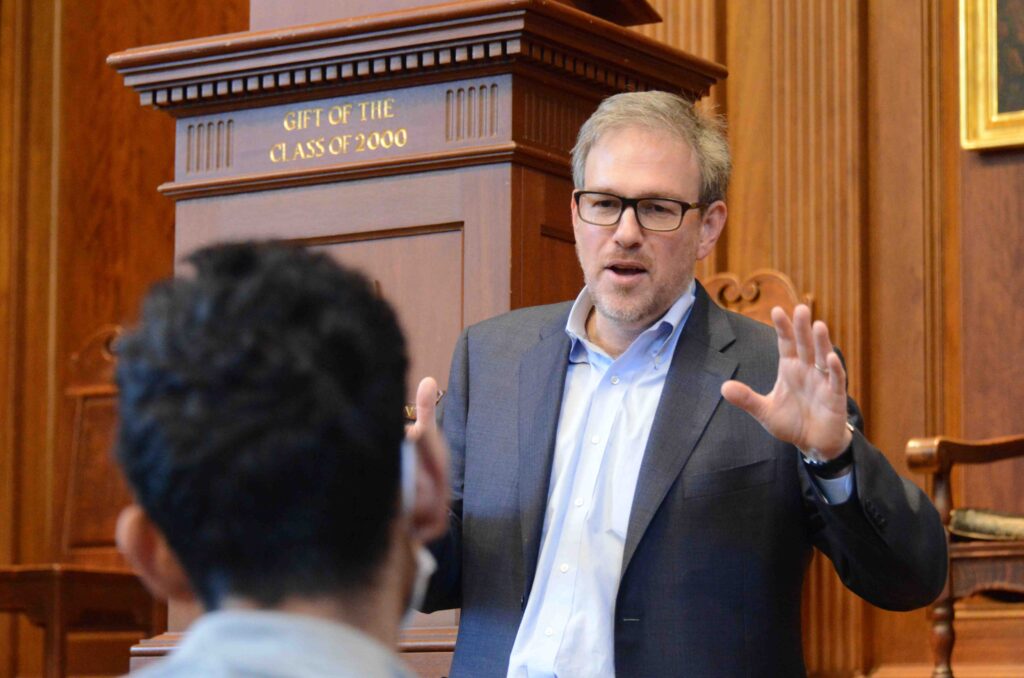Journalist Bret Stephens Shares His Life Lessons
On February 14, famed New York Times journalist Bret Stephens spoke with students, faculty, and guests in Rousmaniere Hall about his life and work. Mr. Stephens—one of the premiere conservative journalists of our time—has been an Op-Ed columnist for The New York Times since 2017, after a long career with The Wall Street Journal, where he served as Deputy Editorial Page Editor and, for 11 years, a foreign affairs columnist. At The Wall Street Journal, he most notably wrote “Global View,” the foreign-affairs column, for which he was awarded the 2013 Pulitzer Prize for distinguished commentary. Prior to that, he was editor-in-chief of The Jerusalem Post, a position he assumed in 2002 at age 28. He has reported from around the globe and interviewed scores of world leaders. Along with journalist Gail Collins, Mr. Stephens co-writes a popular New York Times column titled “The Conversation,” which contributes thoughtful, balanced commentary on American politics.
Mr. Stephens opened the Hall by mentioning Roxbury Latin alumnus and fellow journalist James Kirchick, Class of 2002. He called James one of the “greatest journalists working today” and passed along a message of thanks from James to teachers Stewart Thomsen and Mo Randall. Mr. Stephens then continued by offering “vignettes from [his] life, to hopefully inspire some [students] to take up journalism as a career.”
He began with his childhood, talking about his youth as a Jewish-American being raised in Mexico City. He described himself as an “insider-outsider” as a child, and having that “hyphenated” identity has, he said, perhaps been the richest feature of his life. Mr. Stephens said he believes that “true thoughtfulness lies in the hyphen.” He brought this hyphenated identity into his teenage years, when at 13 he realized he would need to move to the United States for his high school education. He attended Middlesex School in Concord, Massachusetts, where he and his peers embraced “constructive rebellion”—starting a second, more irreverent student newspaper and pulling pranks with classmates.
After Middlesex, Mr. Stephens studied at the University of Chicago, where he emerged a better thinker from so many “intellectually humbling” experiences. He then took the audience through the up-and-downs of his career: from his first job at a magazine right out of college—which, he describes, ended in humiliating fashion—to The Wall Street Journal and the prestigious role running The Jerusalem Post at the age of 28. When he returned to the WSJ and won a Pulitzer in 2013, he reflected back on how his earlier work experiences shaped who he had become. He shared that if you have enough time to reflect on earlier disappointments—even humiliations—you will likely become thankful for what they teach you down the road.
Mr. Stephens concluded by sharing the reason behind his move to The New York Times in 2017. The move was sparked by his “Never Trump” attitude during the 2016 election cycle. As a traditional conservative, he viewed the rise and right-leaning media’s coverage of President Donald Trump as the “antithesis of a healthy conservative movement in America.” This brought him to the NYT, and he said he knew it would be “okay to be a contrarian.” In his role, he embraces being a dissenting voice, and he feels the only way to “disagree well is to understand well.”
After the Hall, Mr. Stephens spent first period speaking with members of Tripod, answering questions from them and other faculty and students who wanted to continue the conversation.

